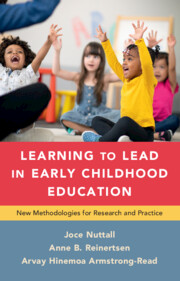Book contents
- Learning to Lead in Early Childhood Education
- Learning to Lead in Early Childhood Education
- Copyright page
- Contents
- Figures
- Acknowledgments
- Chapter 1 The Impetus for This Book: Our Early Childhood Leadership Think Tank
- Chapter 2 Nau mai e Hine ki te Aoturoa a tou tupuna a Tanematuai tiki ai ki roto o Matangireia i a Io Matangaro, i roto o Rangiātea a whata ana
- Chapter 3 Te Kete Aronui
- Chapter 4 Leadership as Change
- Chapter 5 Knowledge Possibilizing
- Chapter 6 A Cultural-Historical Activity Theory Perspective on Learning to Lead
- Chapter 7 Leading Organizational Change: The Case of Haneul Early Learning Center
- Chapter 8 A Conversation between Approaches
- References
- Index
Chapter 5 - Knowledge Possibilizing
A Transgressional Learning and Leadership Model
Published online by Cambridge University Press: 17 August 2023
- Learning to Lead in Early Childhood Education
- Learning to Lead in Early Childhood Education
- Copyright page
- Contents
- Figures
- Acknowledgments
- Chapter 1 The Impetus for This Book: Our Early Childhood Leadership Think Tank
- Chapter 2 Nau mai e Hine ki te Aoturoa a tou tupuna a Tanematuai tiki ai ki roto o Matangireia i a Io Matangaro, i roto o Rangiātea a whata ana
- Chapter 3 Te Kete Aronui
- Chapter 4 Leadership as Change
- Chapter 5 Knowledge Possibilizing
- Chapter 6 A Cultural-Historical Activity Theory Perspective on Learning to Lead
- Chapter 7 Leading Organizational Change: The Case of Haneul Early Learning Center
- Chapter 8 A Conversation between Approaches
- References
- Index
Summary
This chapter describes the “rhizomatic writing machine,” described in Chapter 4, in action in a nursery school in Norway. Data are shared about moments with the children as well as about the experience of writing itself. At the heart of the participants’ experience is the tension between safety and transgression, as they become increasingly willing to share difficult aspects of their daily work with children. Transgressions in this context are understood from a processual perspective, in which change happens in practice when educators understand something new or see realities differently through written approaches. In this way, both the writing process and the sharing of writing become sites for the building of sensitivity, for relationship making, and for serious assessments of the complex nature of quality improvement. Writing becomes equivalent with thinking, with written texts used to prompt questioning and reflection on the intimacy and quality of pedagogical practice. The chapter concludes by stressing the importance of close collaboration between center leaders to ensure strong internal systems exist to support the ongoing developing of staff and of the writing process.
- Type
- Chapter
- Information
- Learning to Lead in Early Childhood EducationNew Methodologies for Research and Practice, pp. 78 - 97Publisher: Cambridge University PressPrint publication year: 2023



